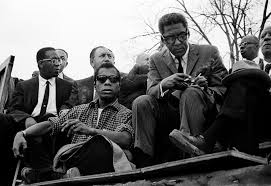Y’all telling me that I need to get out and vote, huh, why?
Ain’t nobody black running but crack-kers, so, why I got to register?
I’m thinking of better shit to do with my time!!!!!
Andre 3000 (OutKast)
The criticism hurled at Black males always increases during political season. One could set their clock by it. Politically engaged Black men realize they are destined to be blamed when a candidate such as Stacey Abrams loses while receiving little of the celebratory kudos when Barack Obama ascends to the Oval Office.
As with most things involving Black men, the injection of their presence into political discussion problematizes matters exponentially. Predictably, much discussion about Black men and the franchise occurs without their input. We are frequently relegated to lab mice commented upon by political talking heads.
If only the political pundits that speak with unwarranted authority resting on little more than copious amounts of historical illiteracy regarding America’s convoluted racial history abandoned such foolishness, they may learn that Black males’ non-participation is attributable to the perceived irrelevance of American politics. Far too many poor and working-class Black men have been positioned in a “damned if you do and damned if you don’t” situation. OutKast’s Andre 3000 insightful lyric that he is “thinking of better shit to do with my time” sums up many Black males’ view of the worthlessness of political engagement.
It is difficult to argue against well-known data that highlights Black men lagging behind their contemporaries in a host of areas such as:
- Educational Achievement
- Life-Expectancy
- Income
- Incarceration Rates
When one considers that we are all conversant on the myriad issues facing Black men, it is time that we begin searching for solutions to the above societal maladies.
The most crucial question facing Black America should revolve around Black men’s inability to recognize that their past, present, and future plights are inextricably linked to the political arena.
Unlike many of my contemporaries, I place the blame for Black males’ withdrawal from the political arena at the feet of Black America. I fully realize that it is a contentious thought to place the blame for Black male struggles in the political arena at the feet of our kind; however, such an assignment is the only one capable of alleviating the matter. Put simply, if we don’t own this problem, we will never take the definitive steps to mitigate it.
As has been consistently stated by those interested in uplifting Black males, “no one is coming to save you Black man.” Hence, we must educate our own in regard to history, politics, culture, economics, etc. Relevant education is the only path capable of reversing the unfortunate pattern of Black men ignoring the political process. I am sure that you agree that an absence of understanding regarding politics guarantees Black America will continue to reap the worst things this society has to offer.
The onus is on Black educators to teach, re-teach, and teach important life-saving material to their brethren. Yet, those in desperate need of such illumination also have a responsibility to listen and learn from those experts who are willing to teach.
We must never forget that “WE ALL THAT WE GOT!!!!!”
